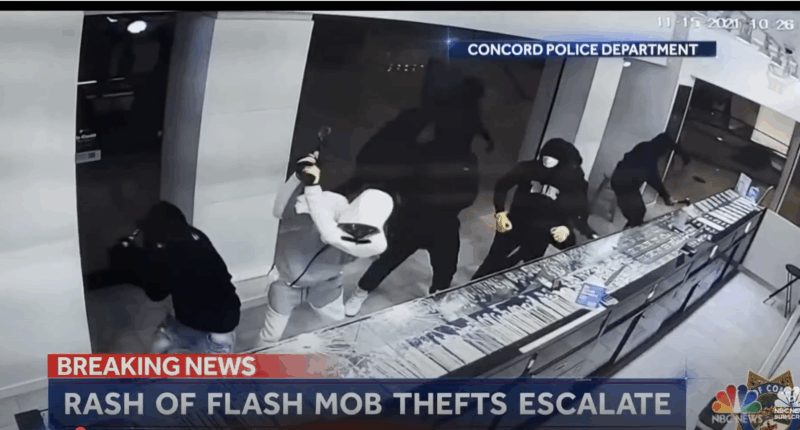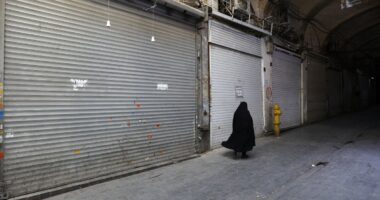In May, IMC Logistics’ Memphis terminal was stormed by a pack of thieves arriving in seven vehicles. The criminals cut the front gates and drove straight to a specific area of the terminal.
“They were interrupted by our security team, but not before they had stolen $25,000 worth of merchandise in just three minutes,” Donna Lemm, chief strategy officer for the Tennessee-based drayage company, told the Senate Judiciary Committee earlier this week.
The hit was no petty theft, and the criminals weren’t your run-of-the-mill thieves. A wave of smash-and-grab retail robberies has swept the country in recent years. In many cases, the thieves are employees of some of the world’s most nefarious criminal enterprises — including cartels, terrorists organizations, and traffickers. And these transnational criminal outfits are using their pilfering proceeds to fund their network of illicit activities.
“One Homeland Security Investigations operation, called King of Thieves, uncovered an organized retail crime ring which had sent millions of dollars in criminal proceeds overseas. That same group financed coyote fees for deported individuals to return to the United States,” Iowa Republican Sen. Chuck Grassley, Judiciary chairman, said in his opening statements at Tuesday’s hearing on a bill aimed at coordinating law enforcement efforts to take on the transnational theft rings.
‘Big Business, Big Money’
Retail theft prevention experts testified at the hearing, titled, “Beyond the Smash and Grab: Criminal Networks and Organized Theft,” each with disturbing accounts of the impacts of the multi-billion dollar crime epidemic. And, yes, the retail theft rings have been supported in no small part by some of the millions of illegal immigrants that poured into the country thanks to Biden administration’s open border policies.
“A few years ago, cargo theft was barely on my company’s radar,” Lemm told the committee. She said in 2021, IMC Logistics recorded five cargo thefts. In 2024, the transportation company reported 876 cargo thefts — a 17,520 percent increase.
“The landscape has shifted, moving from lone criminals to organized theft groups, sabotaging our supply chain,” she said.
And the danger rises with the stakes. Lemm said IMC’s rail partners have shared drone footage of rail pirates cutting air brakes, a potentially deadly act, in stopping cargo trains. Thieves can clear out cargo containers in a matter of minutes, she said.
David Glawe, president and CEO of the National Insurance Crime Bureau based in Oak Brook, Illinois, said some estimates put cargo losses at $35 billion annually.
“It’s big business, big money, and big opportunity,” Glawe told the committee. “The impacts are felt at kitchen tables across the country through higher costs.”
He said Cargo theft losses increased by 27 percent in 2024 and are predicted to rise another 22 percent this year.
Homeland Security Investigations estimates the average American family will pay more than $500 in higher prices thanks to organized retail crime, Grassley said.
‘Waiting for Something Bad to Happen’
The incidents are prolific. In Katy, Texas, earlier this year, investigators tracked local shopping mall thefts to a Mexican cartel connected to more than $100 million in retail thefts nationwide. Law enforcement officials have linked nearly 100 people to the ring.
Grassley noted the Department of Justice recently indicted 11 defendants, including nine illegal immigrants, accused stealing $440,000 worth of Nike shoes from a BNSF train in Northern Arizona.
“The defendants knew valuable goods were in the train cars based on visible high security locks,” the senator said. “The defendants cut the air hose in the train’s braking system, which can cause derailments and serious injuries.”
In 2022, a gang of thieves hit 21 San Diego-area Ulta Beauty stores, ultimately grabbing up $700,000 worth of merchandise before law enforcement officials caught one of the ringleaders. The smash-and-grab robberies targeting cosmetic chains were part of a well-financed, well-organized national crime ring that prosecutors say stole at least $8 million in retail merchandise over the better part of a decade.
San Diego County District Attorney Summer Stephan told the committee that the idea that the thefts are being committed by low-income criminals out of economic necessity is an “absolute falsehood.” She said the Ulta employees victimized by he robberies are still looking over heir shoulders “waiting for something bad to happen.”
Glawe, who previously served as Under Secretary for Intelligence at the Department of Homeland Security and as Special Agent with the Federal Bureau of Investigation, said the cash harvested from the billions of dollars in stolen goods is underwriting the distribution of drugs, weapons, even terrorism.
“We know these stolen goods are going to West Africa and the Middle East,” he told committee members. “From my prior role as under secretary and an FBI agent in D.C., we know that the supply chains are interdicted with Lebanese Hezbollah, we’ve seen that with Hamas, and we know that Mexican drug cartels are involved with the goods going south of the border.”
‘No Boundaries’
Grassley and Sen. Catherine Cortez Masto, D-Nev., reintroduced the Combating Organized Retail Crime Act (CORCA).The bipartisan bill would create an Organized Retail and Supply Chain Crime Coordination Center within the Department of Homeland Security, bringing together federal, state, and local law enforcement agencies working alongside retail industry representatives. The legislation also would provide new tools to assist in investigating and prosecuting organized retail crime, and track and return stolen property and proceeds.
An array of organizations have endorsed the proposal, including law enforcement associations, the National Retail Federation, transportation industry groups, and the nation’s online retailer, Amazon.
Still, Judiciary Committee Democrats couldn’t help but use the hearing to bash President Donald Trump and his administration’s efforts to clean up the country’s illegal immigration mess. Sen. Dick Durbin, D-Ill., complained about giving more power to the Department of Homeland Security — the engine behind immigration law enforcement. Durbin doesn’t like that DHS and its agencies have been enforcing U.S. immigration law. He offered the usual Democratic Party talking points.
“What about those who have been here for years, working a job, showing up every day, raising a family, which is mainly American citizens, and paying their taxes? Is that a priority over what we’re discussing today? Not in my book,” the liberal lawmaker declared.
The bill’s authors say the legislation is about taking on organized criminal rings that are financing illicit activities through illicit activities. illegal immigrants clearly are working for transnational retail theft organizations.
U.S. Immigration and Customs Enforcement last year reported that more than 660,000 illegal immigrants on ICE’s database have criminal histories. Committee member Sen. John Cornyn, R-Texas, asked Glawe if Biden’s border invasion brought unvetted illegal aliens to work in the retail theft rings.
“We know transnational criminal organizations know no boundaries,” the retail crime expert said. He referenced the Sinaloa cartel, which “runs like a Fortune 500 company, moving people and goods. “There’s connectivity to nation-states and terrorist organizations. Vetting is critical in identifying criminal actors.”
Matt Kittle is a senior elections correspondent for The Federalist. An award-winning investigative reporter and 30-year veteran of print, broadcast, and online journalism, Kittle previously served as the executive director of Empower Wisconsin.








